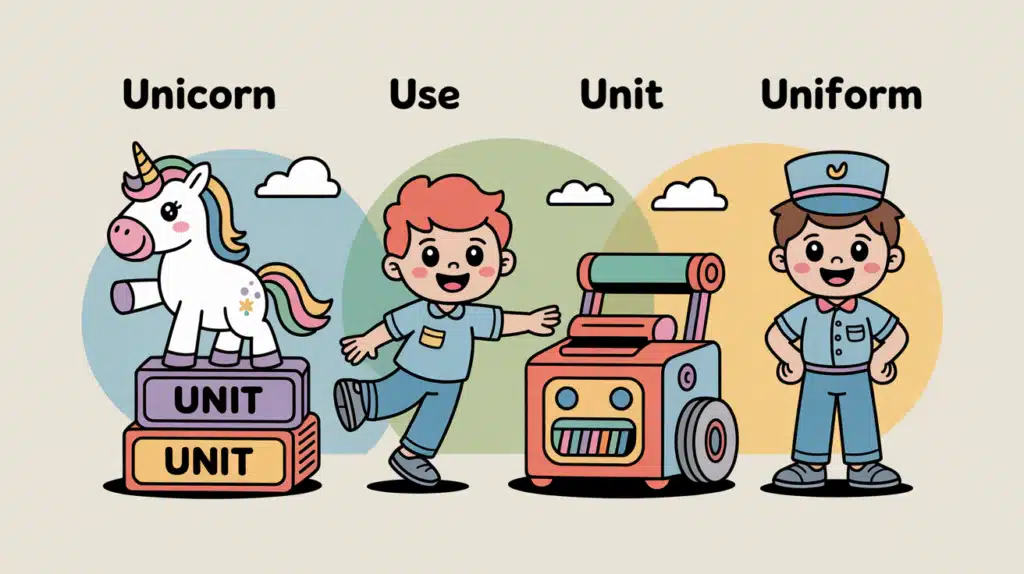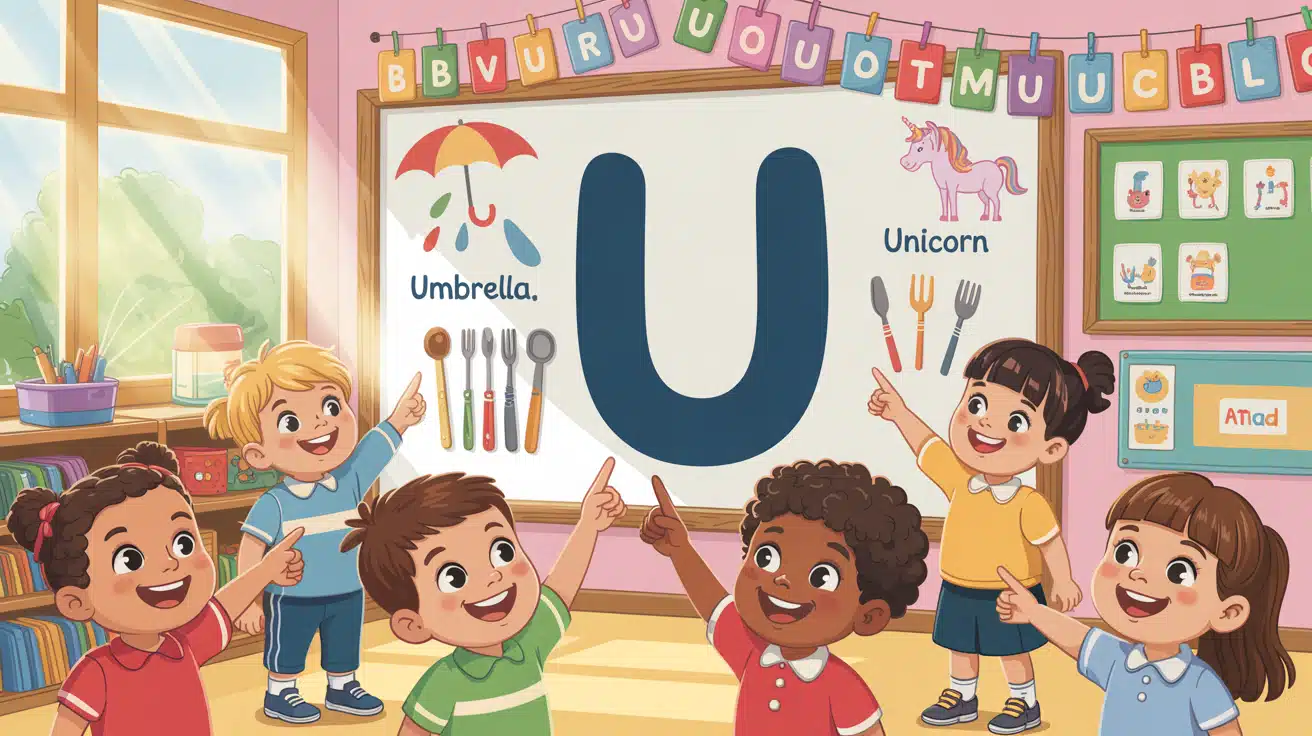If you’re helping a kindergartener learn the alphabet, you’re probably looking for words that are easy, fun, and useful. I’ve put together a list of U words that you can use to teach early reading skills.
You’ll find short U words, long U words, and fun ways to group them into themes. I’ve also added songs, games, and videos that you and your child will enjoy using at home or in the classroom.
This guide is made just for you, so let’s make the letter U easy and fun to learn together.
Easy U Words for Kindergarten
These words are simple and useful for young children. They are easy to pronounce and frequently appear in daily life. This makes them great for early learning and fun activities.
Top 10 Beginner-Friendly U Words
Here are 10 easy U words your kindergartener can learn. Each word is paired with a concise definition to help them understand and remember it better.
Sample Words
Uncle: A male relative, your parents’ brother.
Under: Something below or beneath another thing.
Up: The direction that is opposite to down.
Us: A word that means you and me together.
Use: To do something with an object or tool.
Umbrella: A thing that keeps you dry in the rain.
Uniform: Special clothes worn for school or work.
Umpire: A person who makes rules in a game.
Ugly: Something that doesn’t look nice or neat.
Utensils: Tools like forks and spoons are used for eating.
Short U Sound Words
Short U words are great for teaching early reading skills. These words help children connect letters with sounds. They’re simple, fun to say, and easy to use in phonics games or worksheets.
What is the Short U Sound?
The short U sound is the sound you hear in words like “cup” or “sun.” It sounds like “uh.” This sound appears in many simple words that follow the CVC (consonant-vowel-consonant) pattern.
Helping children learn this sound builds a strong reading base. You can teach it by saying the sound out loud, pointing to your mouth, and letting kids repeat. It’s a great way to help with sounding out words and spelling. Kids love repeating short U words during fun group games or sing-alongs.
Short U Word List for Kindergarten
Short U words are easy to sound out and perfect for early readers. These words help children learn how sounds fit together in simple, fun ways. Start with basic CVC words, each made of a consonant, vowel, and consonant.
Here are some great short U CVC words to teach:
- Bug
- Fun
- Cup
- Sun
- Mug
- Hug
- Nut
- Run
- Cut
- Bus
- Pup
- Tub
- Mud
- Bun
- Sub
These words work well in picture books, spelling tests, and phonics games. Add pictures beside each one to help children connect sounds with real objects.
Practice Ideas for Short U Sound
Make learning the short U sound exciting with hands-on activities. Use rhyming games like “hug the mug” or “bug in a rug” to teach sound patterns. Flashcards with pictures and words help with memory and recognition.
Drawing and matching games enable children to associate sounds with real objects or scenes. You can also create a short U sound wall in the classroom. Let kids add new words they find.
Singing short U songs or doing action-based chants adds movement and fun. Simple repetition in fun ways helps make learning stick.
Common Long U Words for Kindergarten

Long U words make a “yoo” sound, like in “unicorn.” These words are best introduced after children understand short vowel sounds and are ready for a new reading step.
Long U words sound like the word “you.” They often start with “u” and are easy to spot once kids hear the difference from short U sounds. These words help children expand their vocabulary and get used to new sound patterns.
Some common long U words for young learners include:
- Unicorn: A magical horse with one horn.
- Use: To do something with a tool or object.
- Unit: A part or piece of a group.
- Uniform: Clothes worn for school, work, or sports.
Let kids hear the words, say them aloud, and match them with pictures to improve their memory.
U Words by Category
Grouping U words into themes helps kids understand and remember them better. This method supports clear thinking and builds word connections based on everyday use.
U Words About People
These words describe roles or titles that children might hear at home, in school, or during playtime. Learning them helps with talking about people in stories or real life.
Examples include:
- Uncle: A brother of your mom or dad.
- Umpire: A person who makes fair calls during a game.
U Words for Places or Things
These U words name items or locations that children might see around them. Using pictures or real objects makes it easier for them to learn and remember.
Examples include:
- Underground: Below the surface of the earth.
- Utensils: Tools like spoons or forks used for eating.
- Ukulele: A small, guitar-like instrument.
U Words for Feelings or Actions
These words help children describe how they feel or what they do. They help with speaking, writing, and building stronger sentences.
Examples include:
- Upset: Feeling sad or angry.
- Unfair: Not equal or not right.
- Undo: To take something back or reverse it.
- Unite: To come together as one.
Videos and Songs for the Letter U
Videos and songs help children learn through sight, sound, and movement. This multisensory method makes learning more engaging and helps keep young minds focused. It also helps with memory and speech.
Top YouTube Channels Featuring U Words
These channels offer fun videos, songs, and phonics lessons that focus on the letter U. They utilize animation, music, and simple vocabulary to keep kids engaged and learning.
- ABCmouse – Offers letter U songs and tracing videos for kids.
- Jack Hartmann Kids Music Channel – Fun U word songs with actions and clear sounds.
- Bounce Patrol – Energetic music videos that teach letters and words.
- Sesame Street – Videos with familiar characters using U words in everyday scenes.
- Alphablocks – Animated phonics videos that show how sounds make words.
Let kids sing along, clap, or dance while watching to make learning an active and enjoyable experience.
Conclusion
You’ve now got a complete set of U words that you can use with your kindergartener, from simple lists and sound guides to fun songs and hands-on games.
I hope this blog makes it easier for you to teach reading in a clear, calm, and enjoyable way. You can use these ideas repeatedly to help your child build confidence with letters and sounds.
If you found this helpful, consider finding my other posts for additional reading tips and activities. Let’s keep learning together, one letter at a time.




